Forestry
The Forestry Major Offers Four Concentrations:
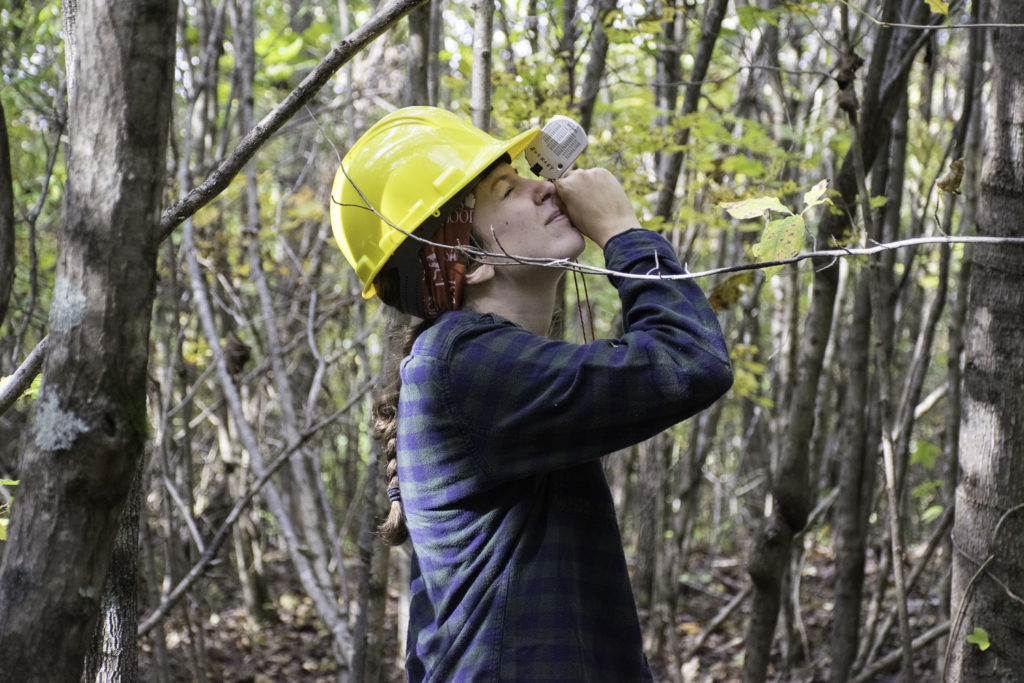
Forest Resources Management*
The forest resources management concentration provides an education related to the management of the broad spectrum of natural resources. In addition to core required courses, there are elective credit hours for broad studies or specialized training in one or more areas of forestry. Examples of specialization include forest biology, forest business management, forest economics, and forest inventory.
The educational programs in the forest resources management concentration leading to the professional degree of Bachelor of Science in Forestry are accredited by the Society of American Foresters under the Forestry Standards. View the full requirements for this concentration.
Outdoor Recreation and Park Management
The outdoor recreation and park management concentration prepares students for careers as professionals in a variety of natural resource management agencies, non-profits, and small business operations. Curriculum includes an internship and courses in recreation ecology, visitor use impacts, natural and cultural interpretation, commercial recreation, research methods, and outdoor leadership. View the full requirements for this concentration.
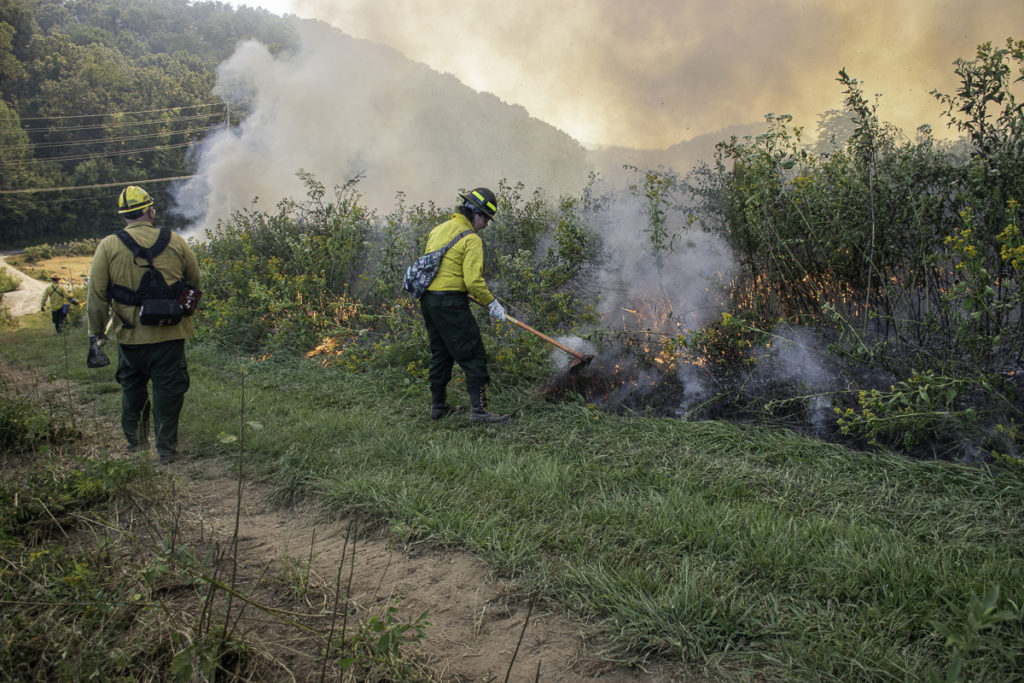
Restoration & Conservation Science*
This concentration prepares students for a career maintaining and restoring the health of our natural landscapes. The program draws from many disciplines and emphasizes forestry, ecology, soil and waters, and wildlife. Curriculum includes an internship and courses in restoration and conservation, and students may specialize in wildlife habitats, watersheds, ecosystem construction, ecology, or biodiversity. View the full requirements for this concentration.
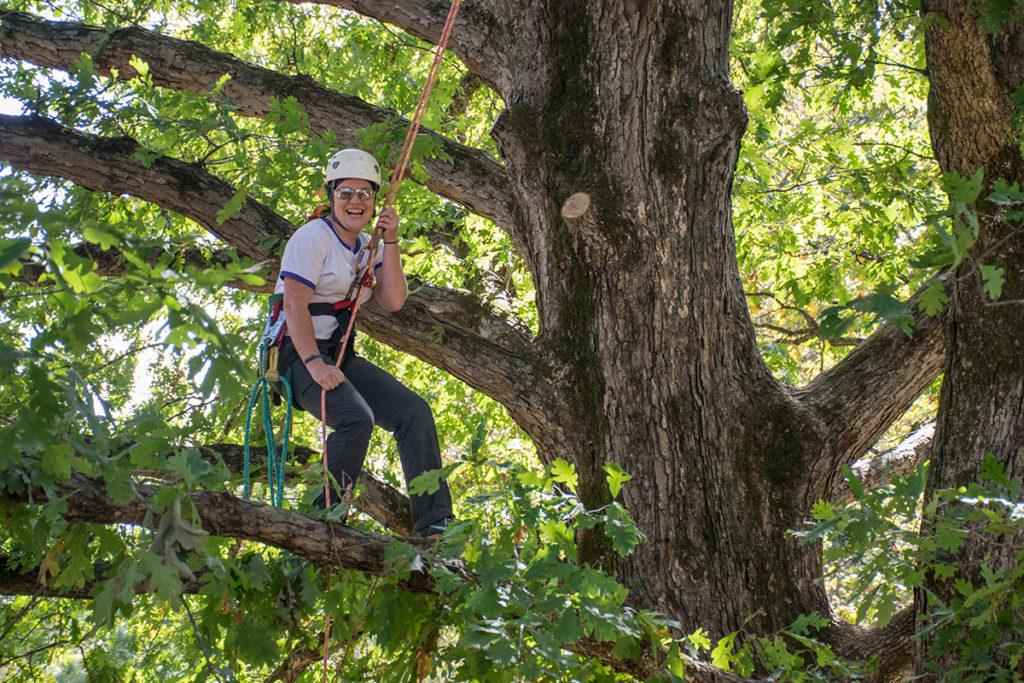
Urban Forestry*
This concentration is an interdisciplinary program emphasizing forestry, arboriculture, horticulture, urban forest management, and urban wildlife. Curriculum is designed to prepare graduates who can evaluate, plan, and resolve problems in urban and traditional forests. Foresters work closely with the public and private sector, so development of personnel management and communications skills is highly encouraged. View the full requirements for this concentration.
Wildlife and Fisheries
The Wildlife and Fisheries Major Offers Three Concentrations:
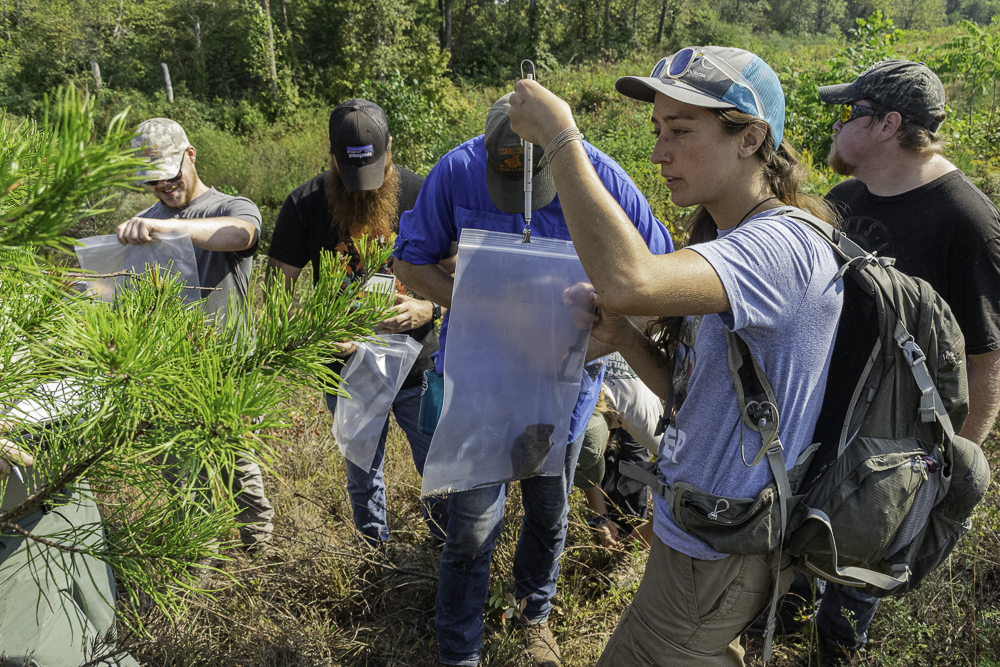
Wildlife Management*
Students in this concentration study the science and art of maintaining populations of wild animals at levels consistent with the best interests of both wild species and people. Management goals may be aesthetic, economic, or ecological. Success depends on the fieldwork of wildlife and fisheries biologists and the scholarly application of scientific information.
Students may take coursework to become an associate wildlife biologist and may graduate with up to three minors in four years. View the full requirements for this concentration.
With careful planning, you could graduate with a BS in wildlife and fisheries science (concentration in wildlife and fisheries management) and up to three minors:
Forestry Minor requirements are automatically met under the wildlife and fisheries management coursework.
The Watershed Minor is automatic if one of ESS 424, GEOG 433, GEOG 436, or GEOL 485 is chosen for the aquatics elective.
International Agriculture and Natural Resources Minor
Students will need to tactfully select GenEd (AGNR 180 or ESS 120/220), take AREC 201 instead of ECON 201, and take FWF 420 for policy. Note that three study abroad hours are required for completion of this minor.
Please discuss all course requirements with your academic advisor and plan accordingly.
The Wildlife Society (TWS) is the premier organization for wildlife professionals. With almost 10,000 international members, TWS promotes its mission “to inspire, empower, and enable wildlife professionals to sustain wildlife populations and habitats through science-based management and conservation.”
TWS offers two levels of professional, industry-recognized certification:
- Associate Wildlife Biologist
- Certified Wildlife Biologist (requires Associate Wildlife Biologist certification and five years post-bachelor’s degree in wildlife experience)
These certifications establish and verify a standard level of training and experience for wildlife professionals. Some natural resource organizations require certification, and most organizations prefer applicants with these credentials.
Through your coursework in forestry, wildlife and fisheries, you have the opportunity to meet requirements to be an associate wildlife biologist. Speak with your academic advisor to make sure you plan your courses accordingly.
Complete the Associate Wildlife Biologist Application Form. See our course options for completing the necessary curriculum.
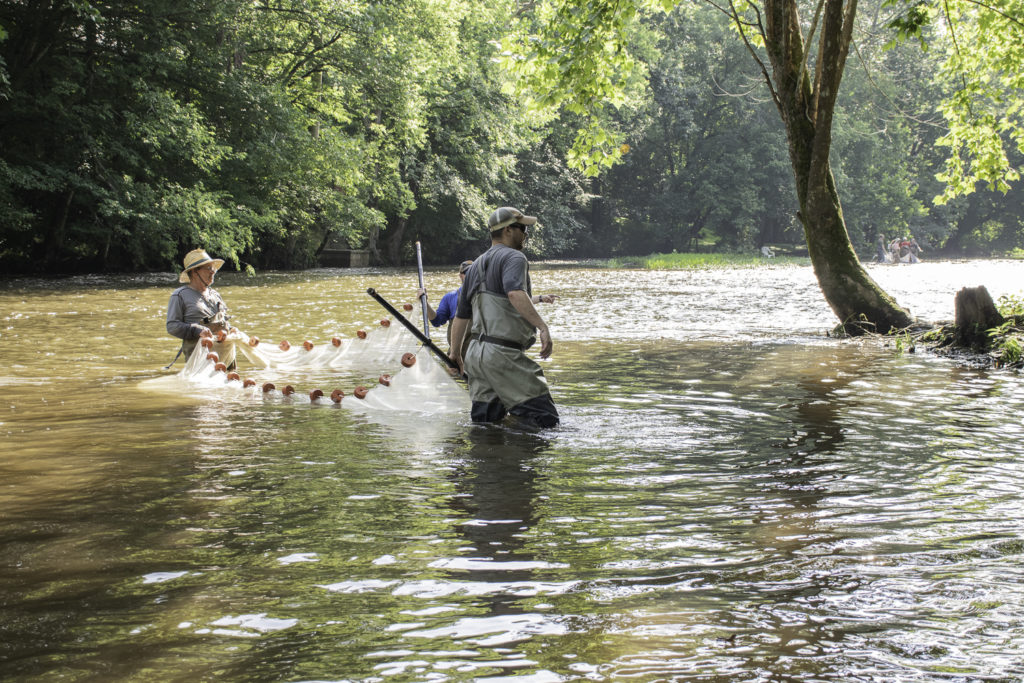
Fisheries Management
The fisheries management program studies the science of maintaining populations of fish at levels consistent with the best interests of both wild species and people. Management goals may be aesthetic, economic, or ecological. Success depends on the fieldwork of wildlife and fisheries biologists, the scholarly application of scientific information. View the full requirements for this concentration.
The American Fisheries Society promotes the scientific research and sustainable management of fisheries resources and encourages comprehensive educational and professional development. It boasts more than 8,000 international members.
AFS offers two levels of professional certification:
- Associate Fisheries Professional
- Certified Fisheries Professional (requires Associate Fisheries Professional certification and 30 Professional Development Quality Points from the past two years)
These certifications provide a standard of experience and education for fisheries professionals. Some organizations and agencies require certification and prefer applicants with these credentials.
You have the opportunity to be an associate fisheries professional through your coursework. Speak with your academic advisor to make sure you plan your courses accordingly.
You can download the Associate Fisheries Professional Application on the AFS website and see the educational requirements.

Wildlife Health
This concentration provides training for biologists interested in ensuring the health of wildlife and fisheries populations, conserving wild species, and protecting domestic animals and humans from diseases spread by wildlife. Wildlife health is a challenging aspect of wildlife management, and students are encouraged to continue with a graduate or veterinary degree after completing this undergraduate program. View the full requirements for this concentration.
* The educational programs in the forest resources management, restoration and conservation science, and urban forestry concentrations leading to the professional degree of Bachelor of Science in Forestry are accredited by the Society of American Foresters under the Forestry Standards. The educational programs in the wildlife and fisheries management concentration leading to the professional degree of Bachelor of Science in Wildlife and Fisheries are accredited by the Society of American Foresters under the Natural Resource and Ecosystem Management Standards.
See our undergraduate course listing
FORS 100 – Forests and Forestry in American Society (3 Credit Hours). Introductory course examining the role of forests in shaping American culture and society and exploring the evolution of the forestry profession in North America.
FORS 214 – Tree Biology (3 Credit Hours). An introduction to the anatomy and development of woody plants, their reproduction, growth requirements, and functioning. Prerequisite(s): Biology 101 or 111.
FORS 215 – Forest Ecology (3 Credit Hours). Ecological interactions among tree species, other plant and animal species, and their environment. Forest ecosystem classification; energy, nutrient, and hydrologic cycles; and site quality. Perturbations and growth, survival and forest composition; forest succession; and fire ecology. Regeneration ecology through establishment and stand dynamics. Physiological ecology, ecological strategies, and adaptations of trees. Contact hour distribution: 2 hours and 1 lab. Prerequisite(s): Forestry, Wildlife and Fisheries 212. Registration restriction(s): Forestry, Wildlife and Fisheries majors.
FORS 217 – Honors: Tree Biology (3 Credit Hours). Students will attend Forestry 214 classes with supplementary assignments. Prerequisite(s): Biology 101 or 111.
FORS 305 – Prescribed Fire Management (2 Credit Hours). Prescribed fire ecology, use, and management in forest stands. Grading restriction: Letter grade only. Prerequisite(s): Forestry, Wildlife and Fisheries 312.
FORS 314 – Economics of Forest and Wildland Resources (2 Credit Hours). Basic principles of forest resource economics. Microeconomic applications in forestry and non-market valuation and analysis. Financial analyses of private and public forest resource management decisions. Prerequisite(s): Economics 201.
FORS 317 – Honors: Economics of Forest and Wildland Resources (2 Credit Hours). Students will attend Forestry 314 classes with supplementary assignments. Prerequisite(s): Economics 201.
FORS 321 – Wildland Recreation (3 Credit Hours). Philosophical foundation of recreation. Planning, development, and management of forest recreation resources. Interpretation of forest resources. Overnight weekend field trips may be required. Satisfies general education requirement: (WC).
FORS 322 – Silvicultural Practices (3 Credit Hours). Application of silvicultural techniques and tree improvement. Use of herbicides and fire management. Prerequisite(s): Forestry, Wildlife and Fisheries 312. Corequisite(s): 305 and 323.
FORS 323 – People and Forest Practices (1 Credit Hour). Examination of how people, institutions, and society at large affect and are affected by forest management practices. Case studies and field applications will concentrate on the wide variety of linkages that exist in society among people and forests. Application of basic skills of collaborative problem solving will be emphasized. Overnight field trips are required. Grading restriction: letter grade only. Corequisite(s): FORS 305 and FORS 322.
FORS 327 – Honors: Wildland Recreation (3 Credit Hours). Students will attend Forestry 321 classes with supplementary assignments. Satisfies general education requirement: (WC).
FORS 329 – Forest Resource Inventory (3 Credit Hours). Form class, site index, volume, and growth estimation. Fixed-radius, variable-radius, and 3P cruising. Prerequisite(s): FWF 313. Corequisite(s): FORS 305 and FORS 323.
FORS 331 – Wood Science for Forestry Majors (2 Credit Hours). A survey of the anatomy, properties, applications and impacts of wood materials. Includes training in wood identification. Similar to FORS 333 but the schedule and expectations accommodate attendance in Fall block. Corequisite(s): 332.
FORS 332 – Forest Products Industry (1 Credit Hour). An overview of the many steps in wood products manufacturing, from forest harvest to finished products. Includes visits to industrial facilities. Corequisite(s): 331.
FORS 333 – Wood Science for Non-Majors (2 Credit Hours). A survey of the anatomy, properties, applications and impacts of wood materials. Includes training in wood identification. No prerequisite. Recommended for engineers, architects, materials scientists and anyone with an interest in this important natural resource.
FORS 335 – Principles of Urban Forestry (3 Credit Hours). Introductory course covers the history of the urban forest, benefits and costs of urban forests, tree biology, urban soil, urban forestry planning and management, urban forestry and public policy, and public works.
FORS 337 – Honors: Wood Properties and Uses (2 Credit Hours). Students will attend Forestry 331 classes with supplementary assignments. Prerequisite(s): Biology 112. Corequisite(s): FORS 332
FORS 345 – Practical Arboriculture (2 Credit Hours). Students will be exposed to modern hands-on techniques in arboriculture that will demonstrate real-world situations and teach students to respond appropriately. Techniques covered will include climbing, cabling, bracing, and pruning.
FORS 411 – Principles of Wood Procurement and Sustainable Forestry (2 Credit Hours). An introduction to wood procurement for forest products companies including different procurement methods, financial and resource assessment negotiation skills, and legal requirements.
FORS 414 – Tree Physiology (3 Credit Hours). Tree structure, growth, development, function, and how these are related to the environment and to cultural practices. Influence of environmental variables on plant growth and distribution. Effects of forest management practices on growth and function. Credit Restriction: Students cannot receive credit for both FORS 414 and FORS 514. Prerequisite(s): Biology 112 or Biology 102.
FORS 415 – Forest Conservation Workshop (1-3 Credit Hours). How forest biology, ecology, and management relate to conservation issues. How current conservation issues can be integrated into classroom work and student projects. Environmental education strategies. Repeatability: May be repeated. Maximum 3 hours. Credit restriction: May not be taken by forestry or wildlife and fisheries majors. Registration permission: consent of instructor.
FORS 420 – Forest Resource Management (3 Credit Hours). Introduction to forest-level management concepts from an economic perspective. Harvest determination; goal setting under multiple-use concepts; taxes; classical approaches to regulation, linear programming and harvest scheduling; and goal programming.
FORS 422 – Forest and Wildland Resource Policy (3 Credit Hours). Policy formulation and criteria for policy determination. Forest and wildland law and regulation. Theory of conflict resolution. Formal and informal resolution. Registration restriction(s): Minimum student level; senior
FORS 423 – Wildland Recreation Planning and Management (3 Credit Hours). Planning processes, master and site planning, and site design projects. Management strategies and methods of visitor and recreation site management. Case studies. Weekend field trips may be required. Contact hour distribution: 2 hours and 1 lab.
FORS 427 – Honors: Forest Resource Management (3 Credit Hours). Students will attend Forestry 420 classes with supplementary assignments.
FORS 430 – Inventory and Assessment of Urban Land (2 Credit Hours). Students will actively participate in tree inventory techniques used in three major metropolitan cities in Tennessee. Different tree inventory techniques (i.e. fGIS, i-Tree, modification of FIA) are used throughout the state of Tennessee. Students will be exposed to the latest technology used both by Regional and City Urban Foresters.
FORS 433 – Urbanization and Urban Soils (2 Credit Hours). Course will cover the below-ground factors that affect tree establishment and survival in urban areas, specifically addressing the importance of soil structure, density, pH, water availability, and chemical properties (i.e. minerals, CEC).
FORS 435 – Trees and the Law (1 Credit Hours). Course will evaluate tree law cases in the United States, focusing primarily on tree problems between private neighbors, government, and public utilities.
FORS 492 – Practicum in Forestry (1-6 Credit Hours). Supervised experience at school-approved employment location. Grading Restriction: Satisfactory/No Credit grading only. Repeatability: may be repeated. Maximum 6 hours. Registration restriction(s): minimum student level; junior.
FORS 493 – Independent Study in Forestry (1-15 Credit Hours). Special research or individual problem in forestry. Repeatability: May be repeated; maximum 15 hours. Registration permission: consent of instructor.
FORS 495 – Internship in Wildland Recreation (1-6 Credit Hours). A highly-structured field experience guided by specific learning objectives. Students earn one credit per two weeks of full-time field experience. The student is responsible for field placement. Must be pre-approved by the instructor and the field supervisor. Repeatability: may be repeated. Maximum 6 hours. Registration restriction(s): Minimum student level; junior.
FORS 496 – Internship in Forestry (1-6 Credit Hours). Supervised experience at school-approved employment location arranged by the student. Students earn one credit per two weeks of full-time field experience. Internship learning objectives must be pre-approved by the advisor/instructor and the field supervisor. Daily log, supervisor evaluations, and final report required. Repeatability: May be repeated. Maximum 6 hours. Registration restriction(s): Minimum student level; junior.
FORS 514 – Tree Physiology (3 Credit Hours). A study of tree structure, growth and development, and function, and how these are related to the environment and to cultural practices. Students may not receive credit for both 414 and 514.
FORS 520 – Advanced Forest Ecology. Delve into current, important forest ecology topics of interest to course participants through surveys of the literature, critical reading and review of recent and relevant publications on a given topic, and vigorous in-class discussion. Provide opportunity to expand into new areas of forest ecology. Enhance skills in surveying the literature, formulating unique research questions and hypotheses, and writing in an organized, persuasive fashion. Enhance skills in critically reviewing papers and proposals, and in developing constructive reviews.
FORS 580 – Advanced Silviculture (3 Credit Hours). Forest stand dynamics, analysis of changes in species composition, and forest stand structure (physical and temporal) during forest succession, response of stands to disturbances (anthropogenic and natural), techniques to make predictions of future stand development.
FORS 630 – Forest Growth and Development (3 Credit Hours). Forest stand dynamics, analysis of changes in species composition, and forest stand structure (physical and temporal) during forest succession, response of stands to disturbances (anthropogenic and natural), techniques to make predictions of future stand development.
SNR 212 – Dendrology and Silvics of North American Trees (3 Credit Hours). Identification, classification, and nomenclature of important North American trees and woody shrubs. Forest associations. Silvicultural characteristics of trees and stands as the basis for the practice of silviculture. Day field trips may be required. Contact hour distribution: 2 hours and 1 lab. Prerequisite(s): Biology 102 or Biology 112. Registration restriction(s): Forestry, Wildlife and Fisheries majors.
SNR 250 – Conservation (3 Credit Hours). Use and abuse of wildland resources. Historical perspectives and current management of forests, wildlife, and fish of North America including aspects of outdoor recreation and pollution problems. Satisfies general education requirement: (NS).
SNR 310 – Wildland Fire Behavior and Management (1 Credit Hour). An introduction to wildland fire management, covering the fundamentals of fire behavior, fire weather, equipment, and safety. Registration restriction(s): Forestry, Wildlife and Fisheries majors. Minimum student level; junior.
SNR 312 – Principles of Silviculture (3 Credit Hours). Principles for treating forest stands to achieve selected objectives. Satisfies general education requirement: (WC). Contact hour distribution: 2 hours and 1 lab. Prerequisite(s): Chemistry 100.
SNR 313 – Measurements and Sampling (3 Credit Hours). Measurement techniques and sampling methods for vegetation. Estimation of animal populations. Contact hour distribution: 2 hours and 1 lab. Prerequisite(s): Statistics 201 or Math 115.
SNR 317 – Principles of Wildlife and Fisheries Management (3 Credit Hours). Ecological relationships of wild animals with other animals and their habitats. Biological, social, and economic aspects of their management. Prerequisite(s): Biology 101-102, or Biology 111-112, or Biology 130-140.
SNR 320 – Human Dimensions of Natural Resources (3 Credit Hours). Natural resource management as a social process focusing on how human, social and institutional factors interact and integrate with complex and dynamic biophysical systems. Influence on natural resource management of human institutions, values, attitudes and behaviors, and place.
SNR 324 – Applied Ecosystem Restoration (3 Credit Hours). This course will build upon the principles of ecology to cover the theory and practical knowledge needed to restore the structure and function of ecosystems. (RE) Prerequisite(s): Forestry 215 or Biology 260; and Geography 131; or junior standing in forestry, wildlife and fisheries science, ecology and evolutionary biology, geography, environmental sciences, or landscape architecture.
SNR 325 – Wildlife Vegetation and Habitat (3 Credit Hours). Introduction to interactions between plants and wildlife, including species of conservation concern. Emphasis is on plant species that comprise east Tennessee’s primary wildlife habitats, and the utility of vegetation data in management. Students will be required to participate in at least one day-long field trip. Contact hour fistribution: 2 hour lecture and 1 hour lab.
SNR 415 – Upland Habitat Management (1 Credit Hour). Detailed examination of applied management practices and their impact on wildlife habitat in forests, early successional cover, and cropland. Includes silvicultural techniques, prescribed fire, mechanical field treatment, herbicides, and food plots.
SNR 416 – Planning and Management of Forest, Wildlife and Fisheries Resources (3 Credit Hours). Integrated forest and wildland resource management through developing land management plans and analyzing case studies including conflict resolution. Contact Hour Distribution: 1 hour and 2 labs. Registration Restriction(s): Minimum student level; senior.
SNR 420 – International Natural Resource Issues (3 Credit Hours). Identification and analyses of issues regarding forestry, wildlife, fisheries, and associated natural resources beyond U.S. borders. Biophysical, economic, and cultural elements impacting natural resources at the international level. Cases — Northern Europe, Latin America, Indonesia, and Africa. Credit Restriction: Students cannot earn credit for both SNR 420 and SNR 520.
430 Introduction to Geographic Information Systems (GIS) for Natural Resources (3 Credit Hours) This class represents an introductory course in GIS, with examples and applications in natural resources. Practitioners have become increasingly dependent on spatial data for conducting research and management. This course emphasizes creating detailed, professional grade maps, but also includes the basics of the theory, data collection, and analyses associated with GIS.
SNR 490 – Topics in Forestry, Wildlife and Fisheries (1-3 Credit Hours). Current issues and problems in forestry, wildlife and fisheries. Repeatability: may be repeated; maximum 6 hours.
SNR 499 – Undergraduate Research (1-3 Credit Hours). Experience in research projects under supervision of staff members. Student should make arrangements for research project with instructor prior to enrollment. Repeatability: May be repeated; maximum 12 hours. Registration permission: consent of instructor .
WFS 100 – Introduction to Wildlife and Fisheries Science (1 Credit Hour). Introduction to wildlife and fisheries management; review of research and management topics in wildlife and fisheries and current issues.
WFS 101 – Current Topics in Wildlife Health (1 Credit Hour). All aspects of wildlife health, including current topics, emerging diseases, and impact of diseases on wildlife populations, general disease mechanisms, and career opportunities in the wildlife profession.
WFS 295 – Practicum in Wildlife and Fisheries Sciences (1-3 Credit Hours). Designed to give students practical, hands-on wildlife and/or fisheries experience working with a state, federal, or private natural resources organization. Provides credit for approved employment in natural resources management or research, 1 hour credit for every 160 hours of work. Students may find work on their own or with faculty assistance. Students must submit an approved work plan to their advisor, keep a daily log submitted every 2 weeks and prepare a final written report. Repeatability: may be repeated. Maximum 6 hours. Registration restriction(s): restricted to forestry and wildlife and fisheries science majors.
WFS 305 – Prescribed Fire Management (2 Credit Hours). Prescribed fire ecology, use, and management in forest stands. Prerequisite(s): FWF 212. Corequisite(s): 323 and 341.
WFS 323 – Human Dimensions of Wildlife and Fisheries (1 Credit Hour). Examination of the linkages between people, institutions, and society at large to natural resource management practices. Case studies and application of basic skills of group communication and collaborative problem-solving and planning will be emphasized. Overnight field trips required. Corequisite(s): 305 and 341.
WFS 324 – Wildlife Habitat Evaluation (2 Credit Hours). This course introduces students to the process of wildlife habitat evaluation, with special emphasis on plant identification, wildlife uses of plants, wildlife species habitat needs, and wildlife habitat evaluation methods. Corequisite(s): 305.
WFS 340 – Wetlands Ecology and Management (2 Credit Hours). Ecology, restoration, and management of wetland ecosystems, including biotic and abiotic processes, functions, and wildlife considerations. Prerequisite(s): FWF 317. Corequisite(s): 305 and 323.
WFS 350 – Wildlife Damage Management (2 Credit Hours). Principles and methods for wildlife damage management, including biological, regulatory, practical, and social considerations. Weekend field trips (2) required. Contact hour distribution: 2 hours lab and 1 lab or field. Prerequisite(s): FWF 317. Corequisite(s): 305 and 323.
WFS 351 – Law Enforcement and Public Relations (2 Credit Hours). Fundamentals and general principles of local, state, and federal laws and regulations governing natural resources and their management. Principles and practices of interacting with the public. Prerequisite(s): English 102 and Communication Studies 210. Corequisite(s): 305 and 323.
WFS 401 – Ecology and Management of Wildlife Health (3 Credit Hours). Review of ecological and environmental factors affecting wildlife health, and tools available for effective wildlife disease surveillance and management. Emphasis on the importance of multidisciplinary and interagency collaboration for management of wildlife health problems (same as Wildlife and Fisheries Science 501).
WFS 425 – Tropical, Ecological, Conservation, and Field Methods (3 Credit Hours). During this study abroad course in Belize, you will actively experience the wildlife, ecosystems, and peoples of the tropics, and gain comprehensive insight into tropical ecology and conservation concepts, issues, principles, and practices. In addition, you will gain extensive experience in the field methods and techniques used by managers and researchers to study terrestrial natural resource ecology and conservation in tropical regions.
WFS 431 – Wildlife Physiology and Nutrition (3 Credit Hours). An introduction and overview of the physiological and nutritional mechanisms important behind the regulation of wild animal populations (primarily wild birds and mammals). Wildlife responses to seasonal changes in habitat are critical for understanding management options. Discussion of use of chemical immobilization options, physiological indicators, and genetic analysis of wild animal population dynamics. Credit restriction: Students may not receive credit for both 431 and 531.
WFS 433 – Amphibian Ecology and Conservation (3 Credit Hours). In-depth examination of amphibian life-history strategies, community interactions, and hypothesized mechanisms of amphibian declines. Also covers amphibian monitoring, conservation and management. Credit restriction: student cannot receive credit for both 433 and 533. Prerequisite(s): Forestry 215 or Biology 250.
WFS 440 – Wildlife Techniques (3 Credit Hours). Methods in wildlife damage control, forest, farmland, wetland wildlife habitat management, identification of wildlife field sign, wildlife capturing techniques, and management plan preparation. Weekend field trips (2) required. Contact hour distribution: 1 hour and 1 lab or field. Prerequisite(s): FWF 317. Corequisite(s): 305 and 323.
WFS 442 – Fisheries Techniques (3 Credit Hours). Active and passive sampling techniques for fish and aquatic organisms. Population estimation methods, fish handling and transport, food habits analysis, and marking and tagging techniques. Age determination and incremental growth analysis. Stream assessment. Equipment and instrumentation usage and maintenance. Safety in sampling methods. Weekend field trip may be required. Contact hour distribution: 1 hour and 1 lab or field. Prerequisite(s): FWF 317. Corequisite(s): 305 and 323.
WFS 443 – Fisheries Science (3 Credit Hours). Quantification and management of freshwater fisheries, including population estimation, age and growth, biological assessment, and stocking. Contact Hour Distribution: 2 hours and 1 lab. Prerequisite(s): FWF 317.
WFS 444 – Ecology and Management of Wild Mammals (3 Credit Hours). Biological and ecological characteristics of game mammals and endangered mammals. Current principles and practices of wild mammal management. Weekend field trip required. Contact hour distribution: 2 hours and 1 lab. Prerequisite(s): FWF 317.
WFS 445 – Ecology and Management of Wild Birds (3 Credit Hours). Biological and ecological characteristics of game birds, endangered birds, and bird pests. Current principles and practices of wild bird management. Weekend field trip required. Contact Hour Distribution: 2 hours and 1 lab. Prerequisite(s): FWF 317.
WFS 450 – Fish Physiology (3 Credit Hours). Mechanisms of gas transfer, circulation, excretion, osmoregulation, locomotion, and neural/hormonal control of these systems in fishes. Comparisons and contrasts with physiology of terrestrial animals. Practical applications of fish physiology to aquaculture, pollution assessment, and fisheries management. Registration restriction(s): minimum student level; senior.
WFS 452 – Ecology and Management of Fishes (3 Credit Hours). This course will cover theoretical and applied conservation and management issues relating to the ecology and regulation of fish populations and assemblages. Topics will include the abiotic (physical, chemical) and biotic (predation, competition) interactions facing fishes and how these interactions may be affected by humans, as well as how humans can manage these interactions to conserve and sustain fish populations and assemblages. (RE) Prerequisite(s): FWF 317, Forestry 215, or Biology 260.
WFS 455 – Fish Culture (3 Credit Hours). Principles, concepts, and techniques of culturing economically important fish and shellfish species. Contact hour distribution: 2 hours and 1 lab. Credit restriction: students cannot receive credit for both 455 and 555. Registration restriction(s): minimum student level; senior.
WFS 456 – Recirculating Aquaculture (3 Credit Hours). Growing fish in intensive, indoor systems with reconditioned water. Techniques of solids removal, nitrification, and gas balance. Practical experience with operating system. Credit restriction: students cannot receive credit for both 456 and 556. Registration restriction(s): minimum student level; senior.
WFS 461 – Professional Development in Wildlife and Fisheries Science (1 Credit Hour). This course is designed to facilitate students’ transition from college into a career or post-baccalaureate studies through a combination of lectures, readings, class discussions, and assignments (group and individual). Registration restriction(s): senior standing with major in the School of Natural Resources.
WFS 493 – Independent Study in Wildlife and Fisheries Science (1-15 Credit Hours). Special research or individual problem in wildlife and fisheries science. Repeatability: May be repeated. Maximum 15 hours. Registration Permission: Consent of instructor.
WFS 496 – Internship in Wildlife and Fisheries Science (3 Credit Hours). Supervised experience at school-approved employment location arranged by the student. Internship learning objectives must be pre-approved by the advisor/instructor and the field supervisor. Daily log, supervisor evaluations, and final report required. One credit per two weeks of full-time supervised field experience maximum. Up to 3 credits may be used for science elective. Repeatability: may be repeated. Maximum 6 hours. Registration restriction(s): minimum student level; junior.

